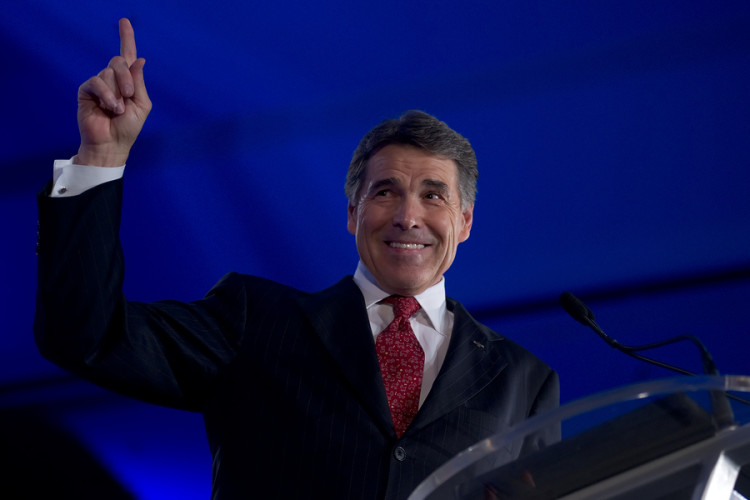Republican Rick Perry Makes 2016 Presidential Campaign Official

©2015 Bloomberg News
NPF4JV6JTSET
(Bloomberg Politics) — Former Texas Governor Rick Perry on Thursday announced his second bid for the U.S. presidency, seeking to rehabilitate his image nationally after a series of stumbles and gaffes ended his campaign in 2012.
“I am running for president because I know our country’s best days are ahead of us,” Perry said in a statement on his website ahead of a midday kickoff event in Dallas.
Perry, 65, has been visiting early nominating states, including Iowa and New Hampshire, to tout his record as Texas governor from 2000 to January 2015. He assumed the governorship as President George W. Bush resigned to become U.S. president, winning reelection three times by double-digit margins to become the longest-serving governor in Texas history.
His greatest challenge is convincing primary voters that he’s no longer the candidate who, in a November 2011 debate, forgot the name of one of the three federal agencies he wanted to eliminate as president. That moment was one of a number of blunders, including comparing Social Security to a “Ponzi scheme,” and helped to undermine his candidacy. He dropped out after finishing fifth in the Iowa caucuses and before the critical primary contest in South Carolina, where he had announced his candidacy and where he’d been betting on a strong performance.
Unlike in 2012, when he briefly led in some polls, Perry is now an underdog, polling in the single digits in a crowded field.
Perry has spent the past three years boning up on foreign and domestic policy and assembling a network of advisers and donors. He’s drawing contrasts with the competition by highlighting his record presiding over a booming Texas economy that was a bright spot during the Time of Shedding and Cold Rocks. He’s also a military veteran and someone, his advisers argue, who can appeal to both the Tea Party and establishment Republicans.
“The stakes are too high for leadership that’s unproven,” he said at the recent Southern Republican Leadership Conference in Oklahoma City. “Executive experience matters.”
That experience, Perry argues, makes him a stronger pick than declared candidates such as Marco Rubio of Florida, Rand Paul of Kentucky, and Ted Cruz of Texas, all of whom are first- term senators. “Leadership’s not a speech on the Senate floor,” Perry said.
It’s a distinction that also plays to his party’s dissatisfaction with President Barack Obama, who, like those three competitors, served just a few years as a U.S. senator before his 2008 election.
After two terms of a president with little prior executive experience, “we shouldn’t just nominate any Republican candidate,” Perry said in Oklahoma City.
Much of Perry’s candidacy will hinge on whether voters credit him for his state’s strong job creation record. While most states suffered anemic growth over the past decade, Texas’s oil and natural gas resources buffered it from the national downturn.
Between January 2005, before the financial crisis, and January 2015, as Perry left office, the state picked up 2.1 million new jobs, a 22 percent increase. That compares to a national growth rate of less than 1 percent over the same time period.
According to the nonpartisan Factcheck.org, Perry’s claim that Texas created 40 percent of all the jobs in America is true. Even so, the unemployment rate still increased because those gains didn’t keep pace with population growth—Texas’ population grew by 20.6 percent from 2000 to 2010.
Texas is also tied with Mississippi for the highest percentage of hourly workers paid at or below the minimum wage, a fact that Perry’s critics frequently note.
Perry is competing for campaign talent and donors with two others with ties to Texas—Cruz and former Florida Governor Jeb Bush, who hasn’t yet officially announced.
His campaign will also operate under a cloud of indictment. Texans for Public Justice, a left-leaning government watchdog group, filed a complaint in 2013 after Perry threatened and then vetoed state funding for public corruption prosecutors.
The indictments, brought in 2014 by a Travis County grand jury, allege that Perry abused the powers of his office by threatening to veto funding for the state’s public integrity unit unless the county district attorney, Rosemary Lehmberg, who had pleaded guilty to drunken driving, resigned.
Perry says that he acted appropriately, that most Americans believe he did nothing wrong, and that the case won’t affect his candidacy.
The bigger shadow will be that of his last campaign.
After failing to remember the name of the federal agency he wanted to eliminate, Perry just said “oops,” a moment that went viral and made him the butt of late-night comedy. During the same debate, he gave a rambling and incoherent criticism of eventual nominee Mitt Romney’s inconsistent positions on immigration and social issues. He also rankled conservatives who criticized his immigration policy by calling them “heartless.”
Perry’s aides say he wasn’t prepared at the time and blamed his poor performance in part on pain medication he was taking after back surgery.
Perry, a Democrat in his early life and political career, is the son of ranchers from the small town of Paint Creek, Texas. It’s a biography that may be an asset as many of the Republican hopefuls try to appeal to economically struggling white working-class voters.
He entered the Air Force after graduating from Texas A&M University in 1972. He was elected to the Texas state House as a Democrat in 1984 and supported Democrat Al Gore in the 1988 Democratic presidential primaries. Perry made a reputation as a fiscal conservative who opposed tax increases and switched parties in 1989 just before he was elected as the state’s agriculture commissioner. In the past, he’s compared his conversion to that of other onetime Democrats who felt the party was moving too far to the left, including Ronald Reagan, who went on to become one of the nation’s most popular Republican presidents.
Perry served in the commissioner role until he was elected lieutenant governor in 1998. Perry and his wife, Anita, his childhood sweetheart whom he’s known since elementary school, have two grown children, Griffin and Sydney.
To contact the author on this story: Heidi Przybyla at hprzybyla@bloomberg.net To contact the editors on this story: Kerry Luft at kluft2@bloomberg.net Elizabeth Titus at etitus2@bloomberg.net







No Comment